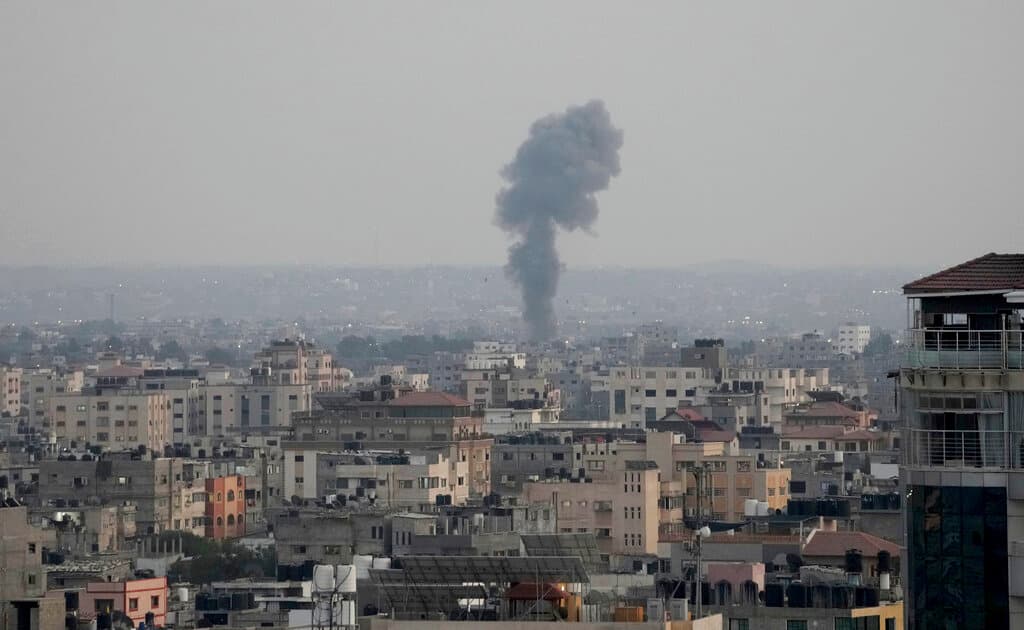Israel Braces for Attacks After Strike Kills Top Commander of Iranian Proxy Terror Group
The IDF airtrikes represent the most ambitious Gaza anti-terror operation since 2019, and a first under Prime Minister Lapid.

Israel is bracing for attacks on its citizens following a strike that killed a top commander of an Iranian proxy terror group, the Palestinian Islamic Jihad. Observers are wondering whether Hamas will now join this junior, Gaza-based partner and whether an all-out war is imminent.
During airstrikes the Israeli Defense Force conducted against PIJ targets in northern Gaza this morning, up to 20 militants were killed, including the organization’s northern Gaza commander, Tayseer Jabari. The attack followed weeks of clashes between Israel and the PIJ.
The airtrikes represent the most ambitious Gaza anti-terror operation since 2019, and a first under Prime Minister Lapid. Israel is now beefing up its defenses: According to Hebrew-language press reports, security officials are weighing several scenarios — from a light, “symbolic” PIJ retaliation to an all-out war complete with continuous missile attacks on Israel’s urban centers and a possible IDF land incursion into Gaza.
For now, Israeli air defense batteries have been beefed up in the immediate areas surrounding Gaza and beyond, as far as near Beer Sheva and Jerusalem. Several IDF units were diverted to the south, and hundreds of reservists were being called up.
Tehran’s closest Palestinian ally, the PIJ has for months led attacks against civilians in Israeli cities. Beyond its Gaza bases, the terror group has expanded its activities to the northern West Bank. Knife-wielding and gun-toting terrorists can more easily infiltrate Israel from areas around Nablus and Jenin, where the border is quite porous, than from Gaza.
Following an uptick in such PIJ-led attacks, elite IDF units have for weeks conducted pinpoint anti-terror attacks in the northern West Bank. In one such raid, an Al Jazeera reporter, Shireen Abu Akleh, was killed near Jenin while covering a fierce gun battle between IDF units and armed PIJ members.
Internationally, the PIJ attacks that preceded the IDF Jenin raid were forgotten, while Abu Akleh’s death became a celebrated cause for reporters, activists, and politicians, including members of the Biden administration. Yet, for the PIJ, the loss of its top operators was much more significant than the global outcry over Abu Akleh’s death.
In a major blow to the terror group, Israel on Tuesday arrested at Jenin a leading PIJ West Bank commander, Bassem Saadi. Since then PIJ retaliation threats have escalated. Bigwigs of the organization, led by Jabari — the man who was killed this morning — repeatedly vowed to launch major missile attacks from Gaza.
A spate of rocket shots from the strip have already sent residents of southern Israel to shelters. The Iron Dome anti-missile defense system has intercepted several barrages from Gaza in the last few weeks. Mr. Lapid gathered his security cabinet and military commanders this morning to weigh options for ending the constant PIJ threat.
“Anyone who tries to harm Israel knows that Israel will stop them,” the prime minister said today, shortly after the IDF launched the operation. The airstrikes, he said, were “aimed at removing a concrete threat to the citizens of Israel and the surroundings of Gaza as well as striking against terrorists and those who send them.”
The pinpointed IDF hits were based on intelligence that identified major PIJ targets — including Jabari’s exact location — while deliberately avoiding hits on Hamas, whose spokesmen nevertheless vowed to join arms with their Gaza brethren. Yet it is unclear whether Hamas will actually do so.
According to several Israeli reports, Hamas, the dominant power in Gaza, has been trying for days to lean on the PIJ to end its rocket attacks for fear of major escalation. An Egyptian delegation has just visited Gaza recently to negotiate with Hamas leaders over rehabilitating the strip’s destroyed infrastructure. Cairo leaned on Hamas to maintain calm.
“I don’t know what Hamas would do now,” a senior analyst at an Israeli think tank, the Jerusalem Center for Public Affairs, Yoni Ben Menachem, told the Sun, “but would Hamas, which is trying to rebuild Gaza, risk a major war that could destroy all their efforts at rebuilding?”
A veteran observer of Arab affairs, Mr. Ben Menachem makes a distinction between the two terrorist organization. “The PIJ is a hundred percent Iran,” he says. While Hamas does get support from Tehran as well, it also has other backers in the region, so it can afford to maintain a measure of independence from the Iranians, he says.
This week the Beirut-based secretary general of the PIJ, Ziyad al-Nakhaleh, is visiting the Iranian president, Ebrahim Raisi, at Tehran. “The Muslim nations of the region deeply hate the usurping Zionist regime and consider resistance as the main and basic line in confronting this regime,” Mr. Raisi said in a joint press conference yesterday.
Still at Tehran, Mr. Nakhaleh this morning vowed that a response to the IDF airstrikes would be “most fierce.” The Islamic Republic would be the top beneficiary of a war over Gaza, which inevitably would entail international condemnations over Israel’s military conduct. Gazans and Israelis would suffer most.

